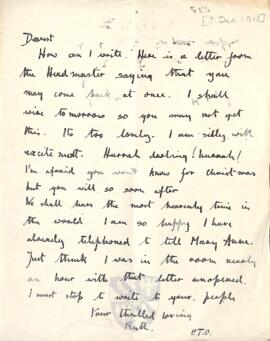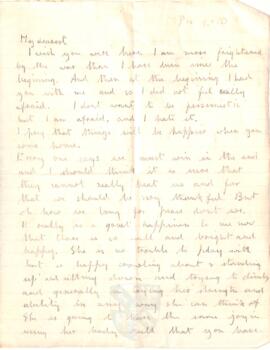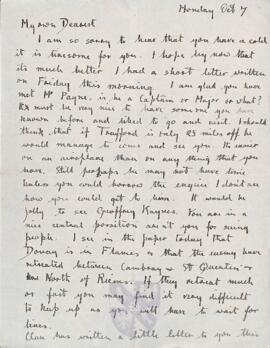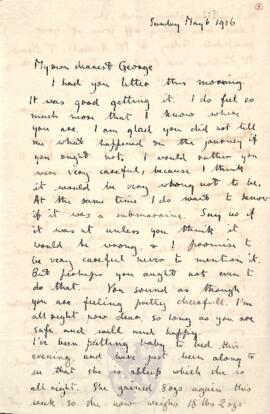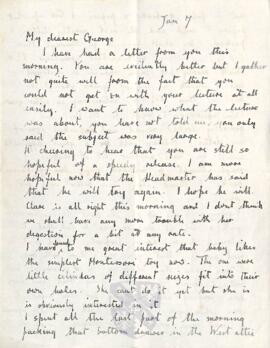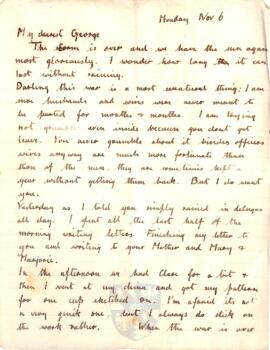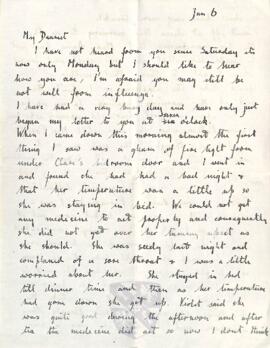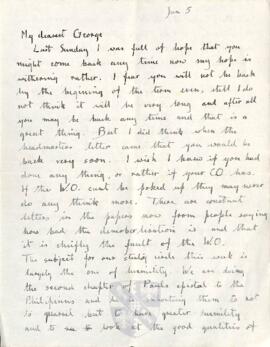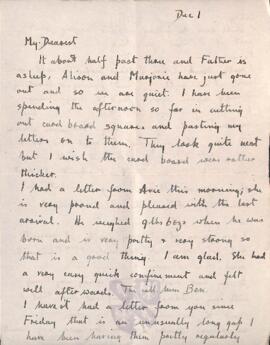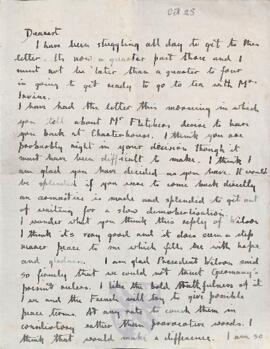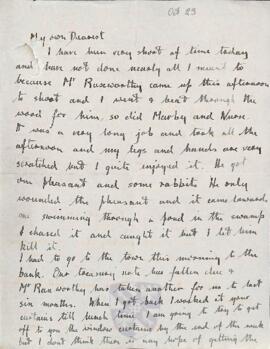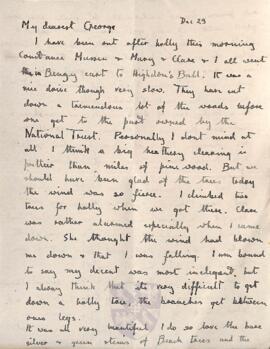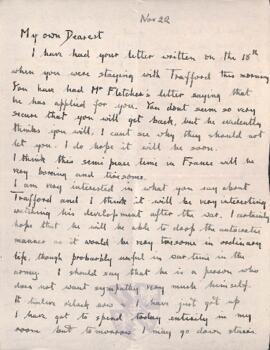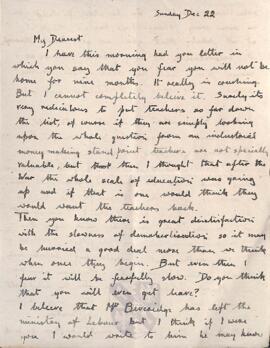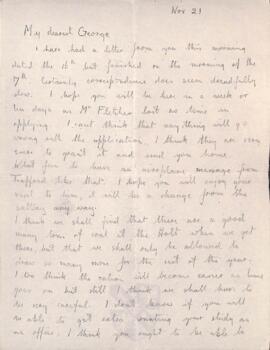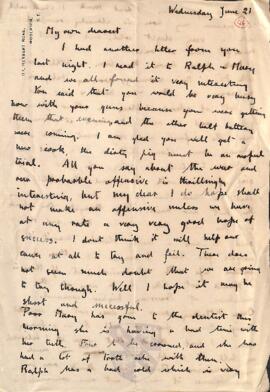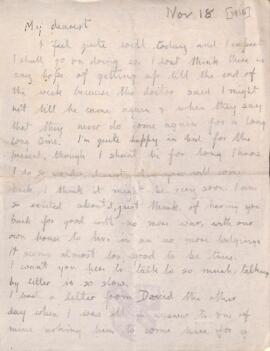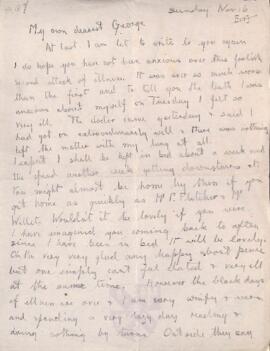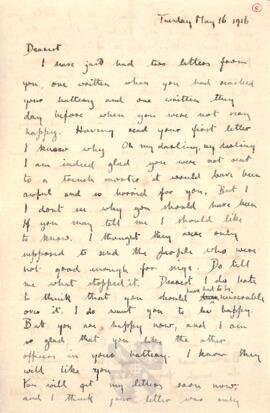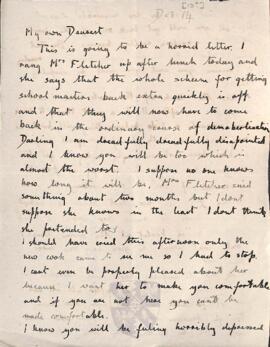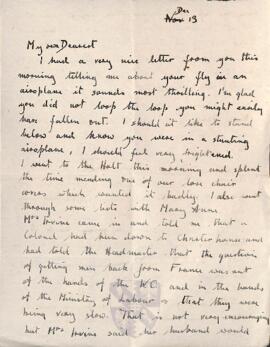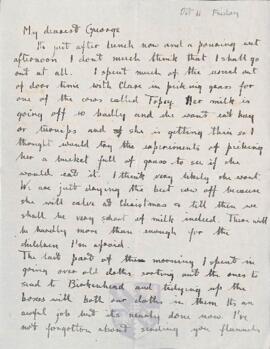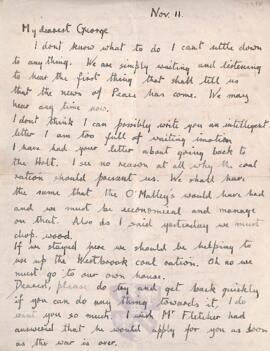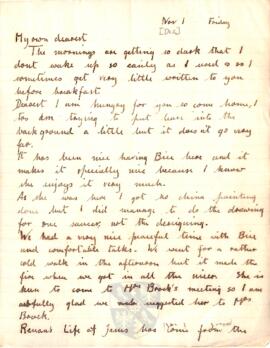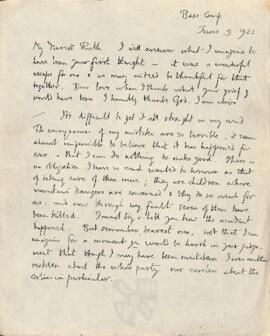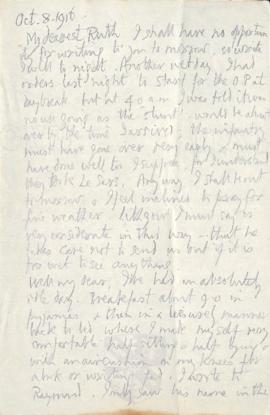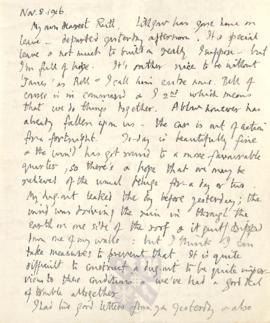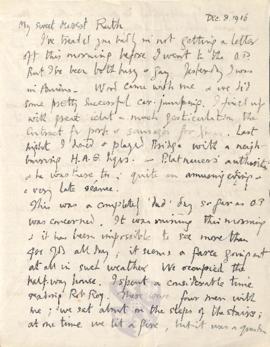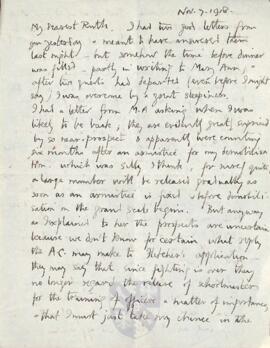Informs him that she has had a letter from the Headmaster saying that he may come back at once. Tells him she will wire the letter but he won't receive it before Christmas. Expresses her excitement for his return and tells him she has told Mary Anne. Thanks him for his Christmas letter.
Saturday 9 Dec. evening - Expresses her fear over the war and hopes that it will end soon. Discusses Clare's progress. Tells him she loves and misses him.
Sunday 10 Dec. morning - Updates him on news from Charterhouse concerning Mr Fletcher the Headmaster. Tells him about the various illnesses going around. Describes a a boy in the naval service receiving a distinguished service cross and asks if he knows him. Tells him they have decided to put on a play at Christmas, The Land of the Heart's Desire by Yeats. She is going to supper with Mrs Brock and expresses her opinions about Duncan Grant.
Acknowledges his letter and asks if he will get to see Trafford and Geoffrey Keynes. Discusses the progress of the war. Tells him Clare has written him a letter. Informs him she has bought an account book and discusses financial matters. Tells him about news from Charterhouse. Describes tooth ache she has been suffering with.
Sunday - Is glad to hear about his journey and warns him not to tell her too much information. Updates him on Clare's progress. Informs him that his pamphlets have been sent to Mr Rendall, Mr Benson, Mr Fletcher and Mr Allen.
Monday - Describes the weather and her plans for the day. Tells him she misses him and updates him on her train journey home after they said goodbye. She hopes that she might be pregnant. Expresses her wish to help the war effort. Informs him she is is going to Hazelmere.
Acknowledges his letter and asks him what his lecture was about. Expresses her hopefulness that he will soon be released. Updates him on Clare's health and Berry's progress. Discusses what to do with their letters to each other and suggests destroying hers but keeping his. Describes unpacking at the Holt. Expresses her longing for him to be there with her and her gratitude that he survived the war. Updates him on news from Robert Graves. Discusses the furniture arrangements and errands to do at the Holt. Tells him she intends to write to Robert and Mary Anne. Send him her love.
Expresses her wish for him to be on leave. Describes her activities of the previous afternoon. Discusses the possibility of him learning book binding. Updates him on Clare’s progress. Describes the visit from the boy Johnstone [friend of Robert Graves] and the conversations they had. Asks him if he needs any more butter.
Asks to hear from him as it has been two days since she has. Informs him that Clare is feeling ill. Describes her search for a launderess. Tells him about attending the study circle and having tea with Constance Mussen. Describes the domestic troubles Mary Anne is facing. Expresses her wish for him to be there to help her.
Discusses if he might be home in time for the new term. Expresses her opinions about the War Office's slow demobilisation process. Discusses in detail her thoughts about the meaning of humility. Describes her relationship with Aunt Maud. Tells him that Mr Raxworthy and Mary Mussen are visiting. Explains how Uncle Hawes intervened with Mr Fletcher for his release. Retells a story told to her by Mr Raxworthy about Mr Fletcher being rude to a General.
Expresses her impatience that he is not home yet. Tells him he has received an electioneering address and discusses who she would vote for if she were able, and discusses politics in detail. Expresses her opinions about the articles written in The New Europe about the German and Russian revolutions. Describes tea with Mr and Mrs Osgood and her afternoon at the baby welfare group. Tells him about a cook that has advertised in the Surrey Advertiser. Expresses her wish to be with him in Paris.
Acknowledges his last letter about his position at Charterhouse. Discusses the progress of the war. Reflects on the nature of their relationship and what it will be like to live together again. Describes having tea with Mrs Irvine. Discusses Clare's progress with her button frame and tells him of her plans to start a Montessori class at the Holt. Tells him that Trafford is home on leave and she intends to post his curtain that day.
Describes helping on a shoot with Mr Raxworthy. Updates him on the progress of making his curtain. Describes a visit to the Brocks and tells him news about the Headmaster and Mrs Fletcher. Discusses the progress of the war. Tells him about making a chocolate cake and the items she will send him. Updates him on her father's health. Tells him that her father and Marjorie have bought a parrot.
Tells him about collecting holly and describes a trip to Highdon's Ball in the cart. Tells him about the trees she climbed in the woods and Clare's reaction to her climbing down. Expresses her love of the trees and wishes he was there. Describes the weather. Asks him if he wants his daffodils sent to him. Informs him she is attending a meeting of the Young Wives Fellowship. Discusses the conversation she had with Mr and Mrs Fletcher and tells him she sent a formal letter to Mr Fletcher about his release. Discusses furniture arrangements for the Holt. Reflects on their relationship and on her own character. Tells him she loves him.
Acknowledges his last letter and discusses Trafford's character and how he might get on after the war. Apologises for him not receiving any parcels while she was ill with influenza and tells him the contents of his next parcel. Expresses her anxieties over starting the Montessori class and the slowness of the postal service. Discusses how to give the appropriate amount of time to the children and their plans for moving back to the Holt.
Expresses her disappointment that he may not be home for another nine months. Recommends that he write to Mr Beveridge and Mr Fletcher about his leave. Discusses arrangements for the Holt in his continued absence. Asks him for his opinion about the Government's organisation of demobilisation. Expresses her gratitude for him surviving the war and her disappointment that it is taking so long for him to come home. Asks him what the French organisation for demobilisation is like. Discusses her opinions on Neitsche and Christianity and the merits of living alone.
Acknowledges his letter and expresses her hopes that he will be home soon. Discusses the coal situation at the Holt. Describes her surroundings. Discusses in detail her opinions about the German and Russian Revolutions. Describes playing with the children. Expresses her happiness that Mr Fletcher has applied for his leave. Tells him that Mildred will not be allowed to go to France to live with Bob.
She has read his letter to Ralph and Mary. Discusses his duties and living conditions as described in his last letter. Expresses her opinions about the progress of the war. Describes her walk with Clare and Mary. Discusses her thoughts on the fear of Hell and the merits of good behaviour. Intends to stay to see Henrietta Livingstone. Informs him his pamphlet has been read by Mr Clutton-Brock, Mr Arthur Benson, and Mr Fletcher and gives their opinions of it. Tells him she is proud of him. Describes the maps of Armentières and the trenches she was shown by Ralph. She hopes he does not have to see dead bodies.
Updates him on her health. Expresses her impatience to have him home. Tells him she has heard from David and updates him on his news and news on Jelly. Informs him of a meeting she wants to attend called the Young Wives Association but can't because she is still too ill. Discusses financial matters surrounding the Montessori classes. Tells him of the local poor population that have died with the flu and the books she has been reading. Expresses her anxiety that Violet might leave.
Informs him she has had a second round of influenza and that she is still on bed rest. Expresses her hopes that he will be home soon. Acknowledges his last letters and expresses her happiness that he has seen Trafford and Geoffrey Keynes. Updates him on Berry's progress and her father's health. Expresses her love for him.
Is happy that he was not sent to a trench mortar and discusses her opinions on warfare. Asks him to date his letters. Asks to know more about his position in the 40th Siege Battery. Tells him she will send him cakes and anything he asks for. Describes her visits to different friends. Tells him of Mr Kendall and Mr Fletcher’s difficulties on allowing Mr Kendall to leave for the war. Updates him on Clare’s progress and describes her recent play date visits. She has updated his parents on his welfare.
Gives him the news that he will be sent home through the normal demobilisation process rather than through the scheme to get schoolmasters back first. Expresses her heartache over this disappointment. Informs him she has engaged the new cook and discusses wages for the staff. Tells him her plans for visits in London. Describes a visit from Marjorie Waterhouse. Reflects on the fact the Fletcher's did not inform her of the demobilisation decision. Tells him about the parcel she has sent him for Christmas. Sends him her love.
Acknowledges his letter telling her about his flight in an aeroplane. Tells him about a conversation with Mrs Irvine about the Ministry of Labour being slow bringing men back from France. Informs him that Marjorie Waterhouse is coming to stay. Updates him on the progress of hiring the cook. Discusses how to answer a letter from the Heanies. Is glad to hear that he was welcomed back by his battery. Updates him on news from Mr and Mrs Irvine concerning the process of applications between the War Office, the Labour Bureau and the Headmaster.
Describes her morning feeding the cows with Clare. Describes the children playing and tells him of Clare's love of books. Discusses the progress of the war. Reflects on whether he will get his position at Charterhouse back after the war. Updates him on the visits they have had that week.
Writes of her anticipation to hear the news of peace. Discusses moving back to the Holt. Asks him to try and get home as soon as he can. Informs him that the bells have been rung for peace. Describes in detail the atmosphere at Church and in the streets with people celebrating, waving flags, and singing. Expresses her hopes that Clare will remember that day. Updates him on her progress in recruiting Mrs Trew to help with the Montessori classes and recruiting members. Describes a conversation with Bridget and Mary Anne. Hopes that she has articulated how happy and thankful she is with the peace.
Describes her morning activities and gives him news from Avie. Reflects that she has not had a letter from him for awhile. Updates him on her health. Describes trying to recruit Montessori class members. Expresses her difficulties in trying to read when there are people around. Describes in detail the nature of Clare's intelligence and expresses her desire that he take an interest in talking to Clare when he is home. Updates him on Berry's progress.
Expresses her wish to have him home. Describes Bice's visit and their activities. She has started reading Renan's Life of Jesus. Discusses the coal situation at the Holt. Tells him about a book she wants to read by Oliver Lodge called Raymond and discusses its content. Updates him on the health of the current master of Charterhouse. Requests that they not talk too much of leave.
Letter to Ruth Mallory describing the Avalanche in which 7 porters were killed.
Full Transcript
My dearest Ruth, I will answer what I imagine to be your first thought - it was a wonderful escape for me & we may indeed be thankful for that together. Dear love when I think what your grief would have been I humbly thank God I am alive.
/ It’s difficult to get it all straight in my mind. The consequences of my mistake are so terrible; it seems almost impossible to believe that it has happened for ever & that I can do nothing to make good. There is no obligation I have so much wanted to honour as that of taking care of these men; they are children where mountain dangers are concerned & they do so much for us; and now through my fault seven of them have been killed. I must try to tell you how the accident happened. But remember dearest one, not that I can imagine for a moment you would be harsh in your judgement that though I may have been mistaken I was neither reckless about the whole party nor careless about the coolies in particular.
When we started from the Base Camp on June 3 the clouds were thickening & it was evident that very soon the monsoon would be upon us; but none can say how soon in such circumstances the monsoon will make climbing impossible. I walked up half despondently with Finch to No 1 Camp; he was clearly quite unfit & could barely reach the camp. Next morning he went back to the Base leaving Somervell & me for the high climbing with Wakefield and Crawford to be back us up.
During the night of the 3rd snow fell heavily & continued on the 4th. We spent a cold day in the poor shelter at Camp 1, a little hut with walls about 3 ft 6 in high built of the stones that lay about there & roofed with the outer fly of Whymper tent. The white snow dust blew in through the chink & one wondered naturally, Isn’t it mere foolishness to be attempting Everest now that the snow has come? It was clear that if we were to give up the attempt at once no one would have a word to say against our decision. But it seemed to me too early to turn back & too easy - we should not be satisfied afterwards. It would not be unreasonable to expect a spell of fair weather after the first snow as there was last year; this might give us our chance at last, a calm day in the balance between the prevailing west wind & the south east monsoon current. And if we were to fail how much better I thought to be turned back by a definite danger or difficulty on the mountain itself.
On the 5th will too [many crossed through] much cloud still hanging about the glacier we went up in one long march to Camp 3 - a wet walk in the melting snow & with some snow falling. At the camp not less than a foot of snow covered everything. The tents which had been struck but not packed up contained a mixture of ice, snow, & water; more than one was badly rent in putting it up. The prospects were not very hopeful.
There was no question of doing anything on the 6th, the best we asked for was a warm day’s rest. We had a clear day of brilliant sunshine, the warmest by far that any of us remembered at camp 3. The snow solidified with amazing rapidity; the rocks began to appear about our camp; and though the side of Everest facing us looked cold & white we had the satisfaction of observing during the greater part of the day a cloud of snow blown from the North Ridge. It would not be long at that rate before it was fit to climb.
The heavy snow of the 4th & 5th affected our plans in two ways. As we should have to expect heavier work high up we should have hardly a chance of reaching the top without oxygen, & in spite of Finch’s absence with his expert knowledge we decided to carry up ten cylinders with the two apparatus used by Finch and G. Bruce to our old camp established on the first attempt at 25,000 ft; so far we should go without oxygen; in taking up the camp (one of the 2 Mummery tents & the sleeping sacks) another 1000 ft we might find it advisable to use each one cylinder; in any case we should have 4 cylinders each to carry on with us next day.
Our chief anxiety was to provide for the safety of the [‘coolies’ crossed out] porters. We hoped the conditions might be good enough to send them down by themselves to the North Col; & it was arranged that Crawford should meet them at the foot of the ridge to conduct them properly roped over the crevasses to Camp 4; there they would remain until we came back from the higher camp & all would go down together. Crawford was also to arrange for the conduct of certain superfluous porters who were to come up to Camp 4 but not stay there across the steep slope below the camp, the one place which in the new conditions might prove dangerous. With these plans we thought we might move up from Camp IV on the 4th day of fine weather should the weather hold, & still bring down the party safely whatever the monsoon might do. A change of weather was to be feared sooner or later, but we were confident we could descend the North Ridge from our high camp in bad weather if necessary, & three of us, or if Wakefield came up, four, would then be available to shepherd the coolies down from the North Col.
But the North Col has first to be reached. With the new snow to contend with we should have hard work; perhaps it would take us more than one day; the steep final slope might be dangerous; we should perhaps find it prudent to leave our loads below it & come up easily enough in our frozen tracks another day.
We set out from Camp 3, Somervell Crawford, & I with 14 porters at 8 a.m. on the 7th. A party including four of the strongest porters were selected to lead the way over the glacier. They did splendid work trudging the snow with loads on their backs; but it took us two hours to the foot of the great snow wall & it was 10.15 a.m. when Somervell, I, one porter, & Crawford, roped up in that order, began the ascent. We found no traces at first of our previous tracks, & were soon crossing a steep ice slope covered with snow. It was remarkable that the snow adhered so well to this slope, where we had found bare ice before, that we were able to get up without cutting steps. In this harmless place we had tested the snow & were more than satisfied.
Higher up the angle eases off & we had formally walked up at comparatively gently angels in the old snow until it was necessary to cross the final step slope below Camp 4.
Now we had to content with snow up to our knees. Crawford relieved Somervell & then I took a turn. About 1.30 p.m. I halted & the porters following in three parties came up with us. Somervell who was the least tired among us now went ahead continuing in our old line & still on gentle slopes about 200 ft below some blocks of fallen ice which mark the final traverse to the left over steeper ground. I was following up in the steps last on our rope of four when at 1.50, I heard a noise not unlike an explosion of untamped gunpowder. I had never before been [knew crossed out] near an avalanche of snow: but I knew the meaning of that noise as though I were accustomed to hear it every day. In a moment I observed the snow’s surface broken only a few yards away to the right & instinctively moved in that direction. And then I was moving downward. Somehow I managed to turn out from the slope so as to avoid being pushed headlong & backwards down it. For the briefest moment my chances seemed good as I went quietly sliding down, with the snow, Then the rope at my waist tightened & held me back. A wave of snow came over me. I supposed that the matter was settled. However I thrust out my arms to keep them above the snow & at the same time tried to raise by back, with the result that when after a few seconds the motion stopped I felt little pressure from the snow & found myself on the surface.
The rope was still tight about my waist & I imagined that the porter tied on next one must be deeply buried; but he quickly emerged near me no worse off than myself. Somervell & Crawford too were quite close to me & soon extricated themselves, apparently their experiences were much the same as mine. And where were the [rest crossed through] porters, we asked? Looking down over the broken snow we saw one group some distance below us. Presumably the rest must be buried somewhere between us & them. No sign of them appeared; and those we saw turned out to be the group who had been immediately behind us. Somehow they must have been caught in a more rapid stream & carried down a hundred feet further than us. They pointed below them; the others were down there.
It became only too plain as we hurried down that the men we saw were standing only a little way above a formidable drop. The others had been carried over. We found the ice cliff to be from 40 ft to 60 ft high, the crevasse below it was filled up with the avalanche snow & these signs enough to show us that the two missing parties of four & five were buried under it. From the first we entertained little hope of saving them. The fall alone must have killed the majority, & such proved to be the case as we dug out the bodies. Two men were rescued alive & were subsequently found to have sustained no severe injuries; the remaining seven lost their lives /.
There is the narrative - the bare facts, on separate sheets for your convenience - not my letter to you but a more impersonal account explaining our plans & their fatal conclusion. I hope it will suffice to let you understand what we were about. You may read between the lines how anxious I was about the venture. S. [Somervell] & I knew enough about Mount Everest not to treat so formidable a mountain contemptuously. But it was not a desperate game, I thought, with the plans we made. Perhaps with the habit of dealing with certain kinds of danger one becomes accustomed to measuring some that are best left unmeasured & untried. But in the end I come back to my ignorance; one generalises from too few observations & what a lifetime it requires to know all about it! I suppose if we had known a little more about conditions of snow here we should not have tried those slopes – [but crossed through] and not knowing we supposed too much from the only experience we had. The three of us were deceived; there wasn’t an inkling of danger among us. //
Writes again on ‘June 14’ [one week after avalanche] – In the interval since I began writing we have packed up our traps and are on our way down - actually I am sitting in a sheltered nook above that little patch of vegetation by the stream above Chobu [village], & it is raining softly which many account for some curious mark on the paper. I don’t want you to think dearest that I am in perpetual gloom over the accident. One has to wear a cheerful face & be sociable in a company such as we are. But my mind does go back very often to the terrible consequences of our attempt with great sadness.
I think it would be a good thing to send a copy of my narrative to a few climbing friends. Claude, to show to his climbing party, David & Herbert Reade. It won’t be of great interest to people who aren’t climbers I should suppose, but one might be circulated to my family too if you think they would like it. I have written to my father & to Geoffrey Young, Younghusband (very briefly) & Frank Fletcher. Please also send the account to Farrar asking him to read it and send it back to you (I don’t much want it to become an official document in the A.C., or at least not yet). And in circulating the narrative you will quote my remarks on p. 7 between marks //.
I don’t know whether you will have got the hang of our plans & arrangements. The reason for going to Kharta is really that the General wants to see that part of the country; the excuse that we want to collect flowers & birds & beasts. I had the chance of going back straight from here, but the chance of seeing the early flowers over the other side was too good to be missed & I’m still hoping to get back after a week or ten days there by a short cut through the corner of Nepal which would be a very interesting journey though extremely wet & should land me in Darjeeling before the middle of July. However that depends much on transport arrangements & I want to get someone to come with me who understands these lingos- perhaps Norton. My possible dates for leaving Bombay are 22nd, 29th July and 1st and 5th of Aug. I shall avoid the 29th if possible as it is a small boat P&O & I would sooner take the Trieste boat on the 1st & come overland. The 22nd is too early in all probability & the 5th (also P&O) is the best boat they have which is a consideration when meeting the monsoon. If I come by P&O I shall probably come to London; anyway I’ll wire giving simply a date (i.e. that of leaving Bombay) and write or wire again from Marseilles or Venice. I’ve been thinking much since your last letter dated April 22 etc. what we would like best to do in early autumn. PyP [Pen-y-Pass] is always attractive & it would be a very pleasant little party; I think we must wait to fix that if we feel like it. Prima facie I’m more in favour of breaking new ground & Richmond in early September might be perfect if Mill [Ruth's sister Mildred?] wants us. I suppose Bob has a job at Catterick; lucky man; he might teach me to fish in those dale streams. I’ve always wanted to go to Richmond.
I’m glad you like the book on botany & find it helpful; we shall be too late to make much use of it together this year, but it’s a thing we must do together sometime – I mean to learn much more about flowers for our children’s sake if for no other reason. But there is another reason; - there is a little shrub in front of me now most prettily blooming with a pink flower, not unlike a rather stiff & thorny rosemary, only the flower is more chartered - which I should much like to introduce into our garden but I can’t tell it’s species.
We are in much reduced company now - Strutt, Longstaff, Finch, & Morshead went off to Darjeeling retracing our steps, about a week ago, & Norton, G. Bruce to Kharta, where we shall rejoin them. I’m much distressed about Morshead’s hands. I fear he’s certain to lose at least the tips (i.e. 1st joints) of 3 fingers on the right hand; & he had a good deal of pain too. G.B. [G. Bruce] writes that his toes are troublesome, but no great harm was done there, & Norton, who was quite knocked out by our climb & a dispirited man after it he has now discovered that what he thought were bruises in the soles of his feet are really frostbite & bad enough to prevent him walking seriously. My finger has almost recovered except for a black nail, so I got off very lightly.
I must finish this off for a mail which is to go off at once. Please give my love to your Father & Marby [written up the side margin:] and make the understand as far as possible about the accident. Many hugs and kisses to the children and endless love to you dearest one. Your Loving, George.
Letter to Ruth Mallory written from France during the Battle of the Somme, 'Oct 8 1916'
Had orders to go to the observation post at daybreak but at 4am was told it wasn’t worth it as the stunt was almost early. Thinks the infantry must have gone over very early and done well as he understood they had taken Le Sars.
Had an idle day. Wrote to Raymond as he had seen his name in the lists yesterday. Also wrote to Mr Fletcher for Cathusian news. Had a game of chess with Dunbar, been for a walk, and developed his ideas for his book. Bell had played his flute. Describes relations between other officers - Bell, Casey, Dunbar, and Lithgow.
Letter to Ruth Mallory written from France during the Battle of the Somme, 'Nov 8 1916'
Lithgow had gone on special leave. Bell was in command and he was 2nd which meant they got to work together. The car was out of action for two weeks. Weather was fine and the wind had changed so hoped they would be spared the deluge for a day or two. His dugout leaked the day before yesterday. Thought he could take measures to prevent that.
Had received letters from her and Mrs Fletcher. The Headmaster hoped to be back at Charterhouse in September. She talked about the unfortunate interest in Robert’s relationship with Johnstone whose mother had found some affectionate letters and refused to allow Robert to see him.
Comments on the questions in her letters - the enclosure from Mr Greig’s solicitors and whether he needed a second table cloth.
Earl had come to lunch. They were in agreement about the war. He would like to cut the Germans’ communications with Turkey before they finished but that shouldn’t delay efforts to obtain terms. Discusses Germany’s move into Poland, French success being due to a mistake by the Germans rather than a weakening of the line, Italy’s advance, and that Germany were paying in the west for her efforts in the east.
Hopes Violet gets better from her toothache quickly.
[Postscript] - asks her to send any copies of his letters which mention the life of the battery as he had to make a war diary - a tiresome job.
Letter to Ruth Mallory written from France, 'Dec 8 1916'
Yesterday he was in Amiens with Wood. He had fixed up the contract for pork and sausages for Xmas. Had dined and played Bridge with the neighbouring H.A.G. headquarters.
Dud day as far as the observation post was concerned as it was raining this morning and impossible to see more than 400 yards all day. He and four men had occupied the half way house and he had spent the time reading Rob Roy [by Walter Scott]. They chatted but weren’t a particularly interesting party. About six hours with no employment.
Had a good letter from her in response to his about the postponement of leave and she was very brave. It may come quicker than he had thought. The Romanian news was so disgusting that he reused to make any comments.
He was feeling better after his feverish cold. Asked for more details about her religious society.
[Letter continues later] - He had just been playing race demons with Lithgow and he describes the game.
Had received letters from her, Mrs Brock, Ursula, and Avie. Wishes Avie would go and stay at Westbrook. Was sorry to hear that the Headmaster [of Charterhouse] was unwell.
Letter to Ruth Mallory written from France
Had meant to answer her letters before dinner last night but had written to Mary Ann and after dinner he was very tired. Mary Ann had asked when he was likely to be back. They thought it would be six months after an armistice was called. This was silly as quite a large number would be gradually released as soon as an armistice was fixed and before general demobilisation. It was uncertain as they they didn’t know what reply the A. C. would make to Fletcher’s application [to release him early as he was a school master]. Would need to consider the situation regarding the supply of coal over the winter. Couldn’t turn the O’Malleys out of the Holt or themselves into the cold so they might have to live at Westbrook for 10 weeks.
Was sorry she wasn’t able to see the desired exponent of Montessori but she had been successful in getting the apparatus.
Glad his letters were arriving more regularly. Had she received the one in which he asked for a plane and a chisel? If not then she needn’t bother about it.
Liked what she said about Will and Ka who were a lovely couple. It would be a joy to knot up friendships after the war. They would have a sense of wonderful freedom from a depressing load after the war. He wrote to David that he felt that the sum of all the springs was bursting upon them. The only jar to their happiness would be his personal ambitions and she would have to help him keep them in order.
